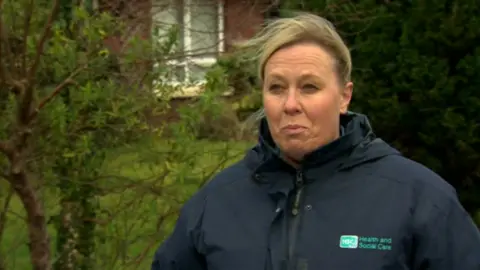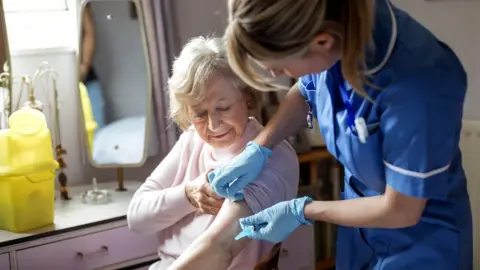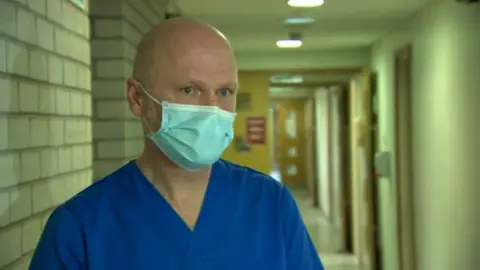Covid-19: Vaccines a 'lifeline' for housebound people
Delivering Covid-19 vaccines to housebound patients is "like a light at the end of a very dark tunnel", a community nurse has said.
Gillian Quinn works at Bangor Health Centre which is responsible for delivering vaccines to people's homes in the South Eastern Health Trust.
So far over 2,800 people in Northern Ireland who are clinically housebound have received their first Covid jab.
Vaccinating that cohort of patients began on 6 February.
They have been receiving the Oxford-AstraZeneca vaccine.
While just under 16,000 people are registered to receive the flu vaccine at home according to the Department of Health a number of housebound people have been receiving their Covid jab at their GP practice as well.
Among those to have received their vaccine last week was Dustin Wright who is 49 and lives in Bangor.

Mr Wright, who has multiple sclerosis (MS), has been housebound for years and said he was "relieved" as he has also been isolating for months.
"Because I have MS I am a higher risk category so getting the jab soothes my mind and will eventually allow people to call round to the house to visit again," he told BBC News NI.
Nurse Quinn said she and others are a lifeline to many housebound patients and bringing the vaccine to them is just another development in the Covid story.
She explained: "Last March was tough on all of us, we were working in the unknown, we were scared and just trying to get on with doing our job.
"But almost a year on look how far we have come."

BBC News NI spent a day with Gillian as she went about her house calls.
Temperatures outside were below zero and a harsh wind followed Gillian as she walked down driveways armed with heavily laden medical bags.
"It's challenging but it's also so rewarding when you get to vaccinate people like Dustin who can't leave their house, patients are delighted to see us and we are delighted at being able to give them their jab," she said.
'It can be a rush'
One challenge is that within each vial there are up to 10 doses of the vaccine, which has a short shelf life of about six hours.
Gillian is constantly monitoring numbers including those on her watch as she drives between houses vaccinating patients.
The vial is kept in a portable fridge which is secured in the boot of her car.
"The cold chain is important, we have to be very regimental with that," she outlined.
"We have to make sure that the vial is kept between certain temperatures and we have six hours to vaccinate 10, possibly 11, people each day. So it can be a rush."
 Getty Images
Getty ImagesAfter leaving Dustin, Gillian travelled several miles to vaccinate Alan McKinney, who is 77 and has dementia.
Each patient gets a cheery greeting as Gillian puts on her personal protective equipment (PPE), sanitises her hands and prepares the injection.
After it was administered Mr McKinney said he felt "100%" and was happy he and his wife had got their first jab.
'Anxious and frustrated'
In order to roll-out the vaccine, community nurses work closely with GPs in individual practices.
It is a well-oiled machine as practices attempt to get around as many of their patients as quickly as possible.
Dr David Reid, who is a GP in Bangor Health Centre, said his team was delivering it as quickly as they get it but he acknowledged some are "feeling anxious and frustrated".
"That creates a massive logistical and administrative challenge and that is being met by practice managers and the admin team.
"To be honest, the easiest thing is putting the vaccine in someone's arm."

However, the pace of the roll-out is not in step across the country.
According to Dr Reid, that is due to what nurses are available in each practice and how quickly they are able to call members of the public to come into the surgery.
"I'm sure those behind the scenes are trying to do this as equitably as they can," Dr Reid said.
"There are frustrations and anxieties but I think, if we look at where we are in Northern Ireland and as part of the UK, our roll-out has been incredible.
"I would just ask people to be patient."
A spokesperson for the Department of Health said "it is anticipated that the vast majority of housebound patients will be vaccinated over the next few weeks".
